How Andor Uses Audio to Explore Oppression and Rebellion
The sound of a reckoning
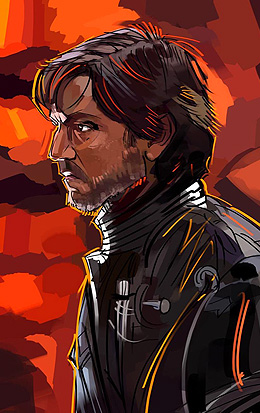
In recent years Star Wars content has been under heavy fire from fans and critics alike with only a few series appealing to viewers. One of these series was Andor, a shining example of how Star Wars content can once again become compelling. There are a few distinct elements in Andor that sets it apart from the rest of Disney’s generic reboots and remakes. The first and more obvious is its return to the original themes of Star Wars: oppression and rebellion. The second and far more subtle element is the way it ties these themes the distinct sounds within the world of Star Wars.
It’s common for movies and series to tie certain characters or themes to certain musical motifs, but what is especially rare is to tie them to diegetic sounds: the sounds that exist within the world of said movie or series. Diegetic sound may include the sound of blaster fire or explosions, as opposed to the non-diegetic ‘imperial march’ theme. In addition to its musical score, Andor uses diegetic sound to explore the tense power dynamic between the desperate control of the Empire and the galaxy’s desire for freedom. Through this exploration Andor introduces a new idea to the audience: to be heard is to have power.
A potent example of the relationship between power and sound is the way the Empire uses sound to exercise control over the galaxy. One such instance occurs in episode nine when ISB agents torture the character Bix using audio. Dr. Gorst, one of the ISB agents, delivers a chilling monologue describing the method he will use. He reveals that in order to build a refuelling station the local population of an outer moon was brutally massacred. The sound that they made as they died had the unique property of causing intense emotional distress to whoever listens. Recordings of the sound were then adjusted into a brutal method of torture.
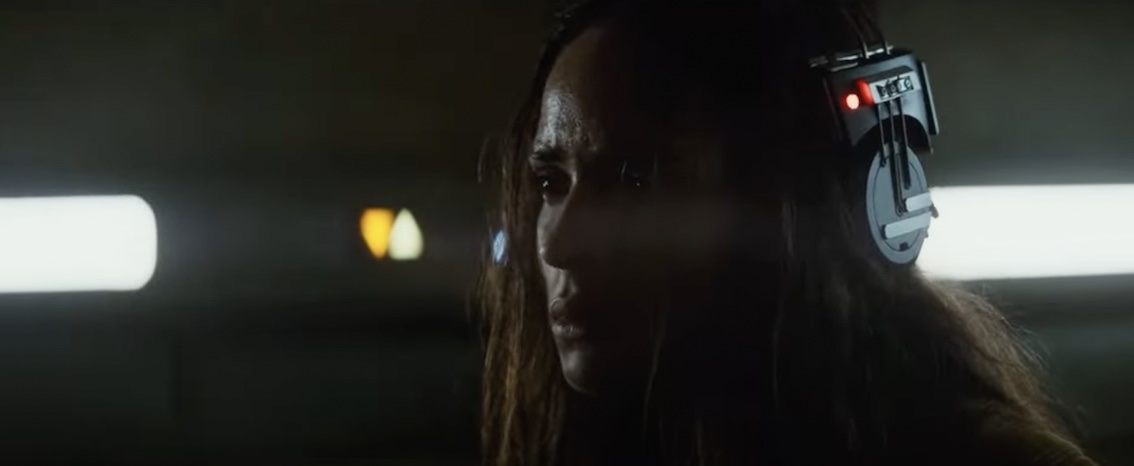
This scene is key to establishing the nature of the Empire. Transforming it’s most heinous crimes into its greatest weapons, the Empire has never seemed crueller. It is the immense pain portrayed by Adria Arjona that sets up the idea that sound can be used as a method of control. This idea is then further reinforced over the Narkina 5 prison arc.
Episodes 8, 9, and 10 are about Cassian Andor’s time in a unique prison where the guards, who carry no weapons, are rarely seen by prisoners. But they certainly make themselves heard. Through the intercom, prisoners are forced to comply to a strict program. Disobedience results in the floors being activated causing immense pain to anyone who is standing on the floor barefoot. By having the guards interact with the prisoners only through the intercom, there is an established distance between the two groups, and a distinct power imbalance.
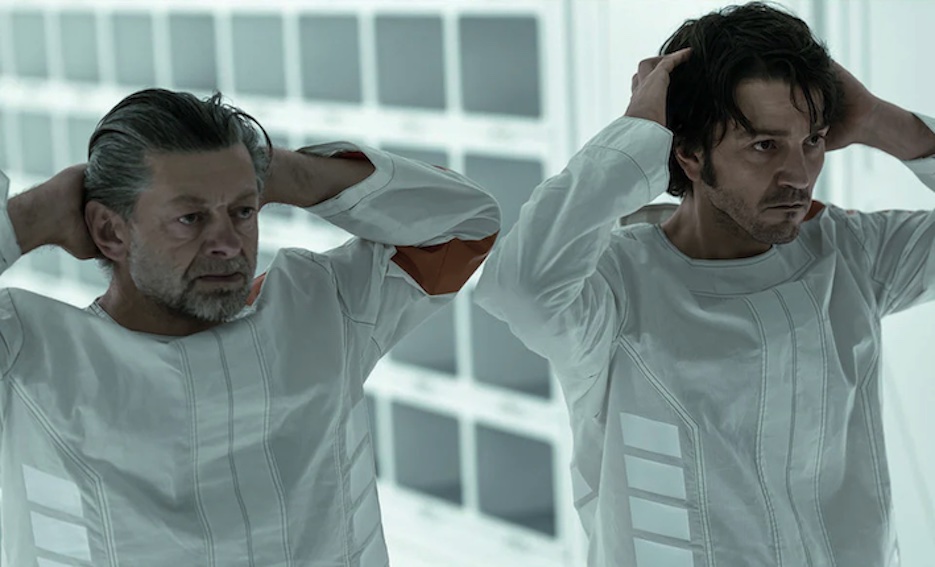
In direct opposition to the dynamic between the guards and prisoners, the prisoners on different levels can see each other but cannot converse. To overcome this hurdle, prisoners communicate between levels communicate through sign language. This serves to reinforce the idea that being heard is tied to power, whilst being unseen creates emotional separation: the prisoners can see each other and thus form a community, but cannot speak and thus have no power.
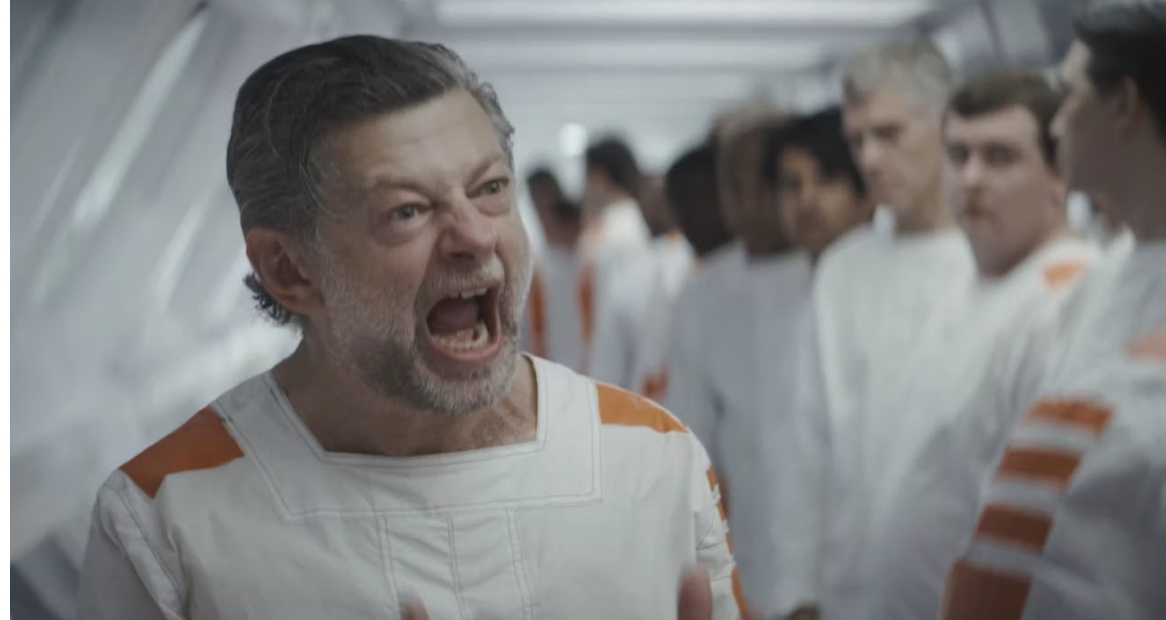
At the end of the Narkina 5 arc, the prisoners use their ability to collaborate between levels to escape. In a powerful scene one of the prisoners, Kino Loy, gains control of the intercom system, flipping the power dynamic on its head. Now that the prisoners are in control, they are the ones who make themselves heard.
This scene harkens back to the Aldhani heist arc, wherein rebels shut down the intercom system of the Aldhani dam. The Aldhani heist arc is worthy of note because it is the first instance in which the Empire loses a significant amount of power and because they lost power because they lost control of the intercom. They could no longer make themselves heard.
While the Empire temporarily loses the weapon of sound, one character learns to wield it. Nemik, a member of the Aldhani heist crew, turns his mind to the politics of revolution and records his ideas in a manifesto. What is interesting is that he chooses to record his voice rather than simply typing his points. This means that although Nemik dies, his voice and his manifesto are present throughout the show. For example, Nemik records that the authority of the Empire is desperate and unnatural, an idea Cassian uses to stir an uprising at the Narkina 5 prison. The influence of Nemik’s manifesto shows that his choice to use an audio recording has immortalised his message and amplified his call to rebellion.
Andor’s season finale is the magnum opus of the series with all its pre-established themes and character motives culminating in the dramatic riot on Rix Road. The setup for this amazing finale also includes the identity of Ferrix and its populace that has been fleshed out through the use of diegetic sound.
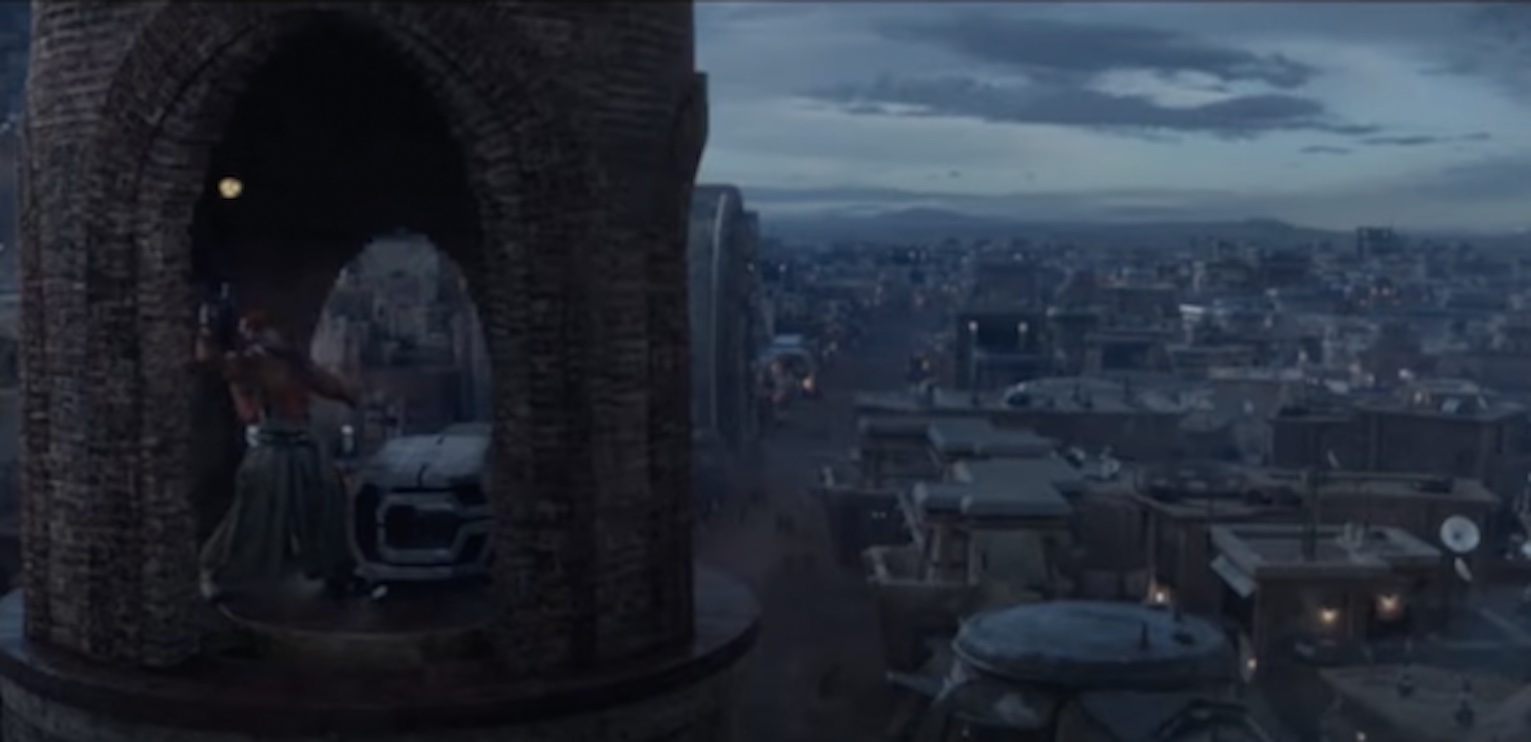
Ferrix is characterised early on as an industrial planet with a close knit community focused on hard work. This characterisation is complemented by the unique bell tower. Rather than an actual bell, the bell tower uses an anvil, a symbol of mining and industry. Its purpose of signalling the start and end of the work day shows that Ferrix places an emphasis on everyone working to contribute to the community. The unique metal sound of the anvil is heard again in episode 3. Hanging outside homes and places of work are ornaments made of scrap metal. When law enforces arrive on Rix road, whoever sees them bangs the metal creating a loud noise to alert others. This alert system serves to characterise Ferrix in several ways. Firstly it is obvious that the people of Ferrix have a sharp distaste for law enforcers. Secondly, the use of scrap metal shows how integral mining and recycling is to Ferrix. Finally, this scene shows the audience how the community of Ferrix is one in which people help each other and rely on one another.
This detailed characterisation of Ferrix serves to enhance finale which involves a funeral for Andor’s mother, Maarva. The townspeople congregate on Rix Road, against the will of the Empire, and play two musical pieces. The first is a sombre marching theme, while the second is far more rousing. The entire scene fits perfectly into the pre-established characteristics of the people of Ferrix. The instruments used are similar to the anvil or the recycled metal ornaments: all metal, unique in design and made from spare parts. The community has banded together for one of their esteemed members, and are doing so in defiance of the empire. In this scene the very act of playing music is an act of rebellion.
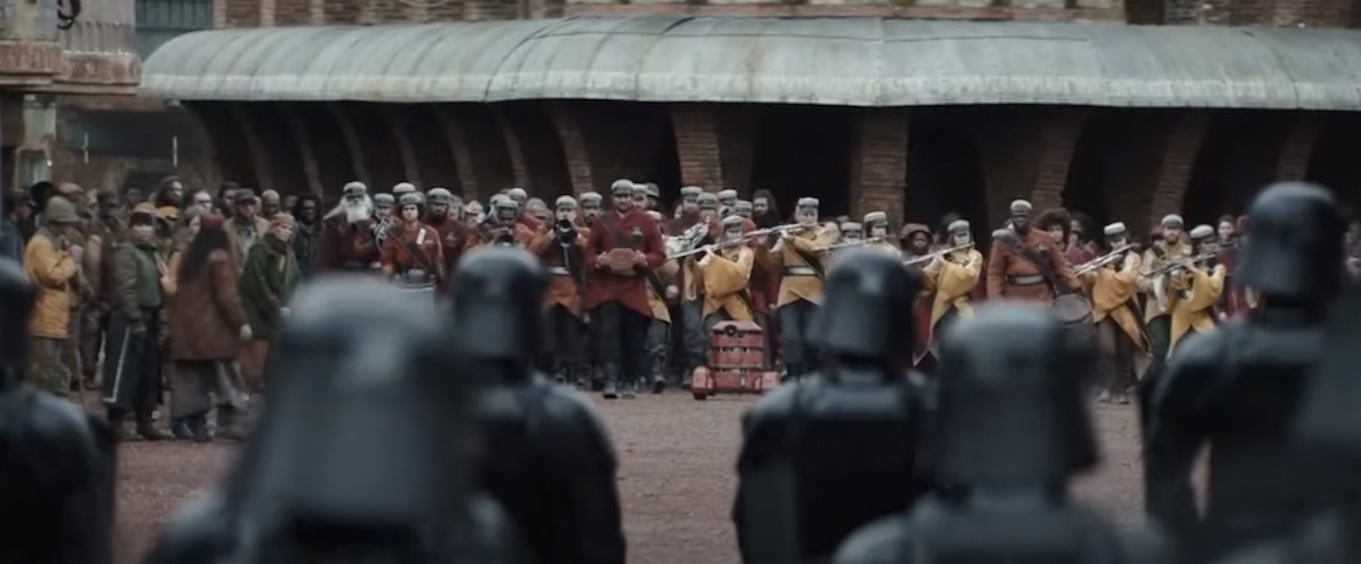
As the band marches down the street, the Empire is scene setting up barricades in a panic. This panic is not new. Every time the people of Ferrix make themselves heard, the Empire panics. For example in episode three when law enforces hear the banging of metal ornaments, one demands answers from Maarva. Her reply perfectly explains the importance of diegetic sound in Andor:
That’s what a reckoning sounds like.
Maarva Andor
The noise made by the people of Ferrix is the representation of defiance.
It is no coincidence that the finale includes a reading of Nemik’s manifesto which describes how ‘even the smallest act of insurrection’ contributes to the rebellion. Even Maarva’s speech, displayed by her droid as a hologram, contributes to the rebellion. One law enforcer covers up the display, but the audio can still be heard clearly. For the people of Ferrix it is a call to arms, and incites a riot.
In our own world, protesting can be described as the struggle to be heard, debating is often simplified into being louder than ones opponents, and winning elections often comes down to silencing all opposition. The series ‘Andor’ attempts to help viewers understand the relationship between power and being heard. During the course of the series, torture was conducted through headphones, prison breaks were incited through the intercomms and riots were started because of music. Every time a character makes themselves heard, they wield power.
Over the decades, star wars has somewhat lost sight of the original themes of the series: rebellion vs oppression. Andor has brought its audience back to those original ideas through the interesting medium of diegetic sound. Rousing speeches are not uncommon in film and TV series, but for a show to explore its key messages all through audio is very rare, and it is clear from the response Andor has garnered from star wars fans, this unique method of exploring the malice of the Empire and the spirit of rebellion was executed very well.
What do you think? Leave a comment.











I am kinda mad this is clearly the best star wars media in recent memory and there’s not a single shot or mention of a lightsaber. 😔
This is an excellent detailed analysis. I practically agree on everything, as the sound and visual details provide realism never seen in the saga to the fact that the characters raise the symbolic character of both the rebellion and the empire. Thank you for bringing me to think about this wonderful series again.
A friend and I laughed about the first two episodes. We called it Waiting for Something to Happen. But gradually we found it one of the best Disney series in the Star Wars fold.
Andor is great because it never once explains the technology on show … just like in our world, we don’t give a shit about technology just as long as it works.
This article puts into words how i feel about Andor. This is a really good piece.
The aesthetics of Andor actually remind me quite a lot of the way the original Star Wars trilogy looked. Those films had a similarly conservative approach to grand sci-fi vistas and a interest in showing the more grimy, lived in aspects of a science fiction world.
Andor has gotten me back into Star Wars. A stunning show.
The reason I adore Andor so much was the depiction of The Empire. I have worked for some big bureaucracies, and the meetings, inside competition, power play, etc. were chilling for me. Unlike movies like Avatar which slaps you in the face with “THIS IS AMERICA MILITARISM AND THAT IS BAD” it felt like Andor just gave you a peak inside the middle management of the empire and let you figure it out for your self. I have rarely enjoyed squirming so much.
Great observation! The detail in the audio design reminds me of the animated Ghost in the Shell movie.
What I appreciated about the series (even though I’m only half way done) is the tone of the show. By slowing the pace and developing the characters, we feel more compelled to become invested in this fictional universe. It’s the attention to detail, the nuance and respect it has for the characters of this world, where it’s not just Cassian plus others, but a more immersive experience.
The scenes of Syril back at his mother’s apartment and how despondent he feels is something that I appreciated. He’s clearly on the evil side of the spectrum and yet, we are invested in his motivations because he’s not some broad, formulaic archetype that we’ve seen time and time again. The corporate bureaucracy, the social politics, the character motivations, the delicate multifaceted way the characters are portrayed, all of this is a welcome addition to the kids who loved SW but are now adults and can’t identify with the shows that feel so broad and poorly defined.
The audio in Andor makes the fiction visceral.
Andor is an amazing piece of art, it’s written well and shot well… I described it to a friend as a Star Wars universe version of Tinker Tailor Soldier Spy.
Andor is my favorite show of 2022. Viewers feel compelled to think deeply about the show’s themes because it has made the effort to present a world that always feels real — and you can’t have a real world if you don’t hear the crackling fire or see the nuts and bolts in a character’s hand or see the character covering himself against the rain.
Oh how I live for the audio details. My all time favorite game Breath of the Wild the sound details are off the charts and makes a level of detail that just is perfection or as if it mattered to the creator to even have the most insignificant thing have a feel. I will be watching Andor now just for this reason. What a great way to put what I always felt but just didn’t know what was missing.
The show could have been any other show and not have anything to do with Star Wars and it would have changed nothing, that makes it pointless to me.
Sad because Rouge One is the best Star Wars “thing” made since the original Trilogy but this was just meh…
Great assessment of the AMAZING Andor. Sometimes, like in an old movie (or more recently in the new musical MATILDA on NETFLIX) the theatrical artifice becomes part of the charm – telling us this is NOT the real world. In fantasy like the SW universe et al, part if the world-building is to immerse us in that world and to establish its rules and context. The moment I see a digital world, THEY LOSE ME. It’s like watching a bad magician – the tricks become distracting and transparent and I don’t engage in the world or the story. But Andor has this extremely interesting setting, and profound sound design that really makes it work.
I really enjoyed Andor but had no background to understand why. Your analysis on the audio explains why.
Until I saw Andor I never realized how flat the other star wars shows (and marvel stuff as well) look. I also loved how retro the props feel, like theres real history and life behind it.
It was a genuinely masterfully crafted show, but I did feel the first three episodes didn’t set it up well and were not well written. They didn’t make us care about the characters, they felt annoying in many cases. In something like House of Dragon, we get to care about the characters immediately. But of course it got better here, and ended on an amazing note.
There’s something about Andor that I feel is uniquely drawing me in as a watcher–I didn’t realize what it was until I read this post. Well put together points here, and I cannot wait until season 2.
I liked the read, but Andor feels like im watching cheap fan films, because basically that’s what Star Wars has become since George Lucas left. It’s his world so I feel no one else can replicate his idea of what the Star Wars universe is and looks like.
I love Andor and I appreciate the decisions they’ve made with the sound. Andor is not about space wizards, magic and laser swords, it‘s about a revolution we‘ve come to know and how it arose from the bottom, from real people with real hopes and fears. I felt that every decision made by the characters mattered and every conversation between them held weight. It explores the morales of the characters on both sides and gives a deep insight into the workings of each faction. Easily my favorite Star Wars project since Empire Strikes Back.
Obi Wan and Boba Fett which were, imo, both exceedingly bad. Andor has been a excellent example of how to write star wars.. I hope we get less star wars going forward but with higher quality.
I really don´t know why everyone are rooting for Andor this much. To me this series suffers from many problems that other series like Picard also struggle with. The biggest are lazy writing, many important moments just happening offscreen and the expectation for you to care about characters that are barely or don´t introduced.
Nice take. I did find this to be the most realistic and immersive Star Wars content. I hope that this director, who also directed Rogue One, gets a spot to direct the new Sequel Remakes!
Really brilliant show! I think you also feel this vibe a lot in Game of Thrones when comparing seasons 1-4 to the following. In a sense, the first seasons with their limited budget knew they could only “extend reality” (i.e. set extension, matte painting, etc.), which really grounded the world in realism. Then as seasons moved on, we got more and more “helicopter shots”, which felt quite unnatural for a medieval show (excluding dragon shots ofc)
Feels like a lot of what makes the Andor scenes great is what makes Tales from the Loop great. A personal, grounded story at the forefront with the fantastical elements just existing around it.
God damn how I loved s01, please, keep it going for s02! Nothing they ever did even comes close. I prefer this to ANY of the movies, except TOT.
If all of Star Wars was filmed and directed with this kind of reverence from now on, I would be soooo happy.
Maybe we needed the time, and maybe we needed the world to be in the state it’s in right now, but it’s taken so many decades to realise that what people (maybe of a certain vintage) really want from Star Wars is a fight against the Empire.
It’s funny though, how many people enjoy cosplaying as Storm Troopers, Sith, and Darth Vader.
Wish more people will watch it.
The elephant in the room may be the reason a lot of Star Wars fans are not watching this. Andor is populated with a lot of avatars for those very fans who have problems with POC, female characters and stories that are full of grey.
This is easily my favourite series this year.
Maybe some truth in that, but I think a bigger reason is that it went head to head with ROP and HOTD.
Now those have finished and the show is being made available on more platforms, I think more will be watching.
The biggest factor is that it doesn’t include pew-pew just for the sake of it.
The reason a lot of Star Wars fans are not watching this is, they are either 12 years old, or they are American. Basically the same thing.
Andor is a masterpiece. Last Jedi trilogy was so horrible and glad that the Disney plus showed what it is all about.
All of the D+ Star Wars shows have sounded great. Top notch work all around.
I hope this new grown-up version of Star Wars is the way forward from here on in (though a few more sassy droids and creatures would still be welcome)
But should Star Wars be ‘grown-up’? The entire premise is 1) silly, 2) aimed at kids, and 3) meant to be that way – after all, the films start with a ‘once upon a time’ analogue. And what’s wrong with that? Making something that is inherently a little bit silly and juvenile for ‘grownups’ seems to be doing a disservice to both groups – children miss out of the fun their parents had with the original series and ‘grown-ups’ suffer arrested development. Is that really a good idea?
At last there’s Star Wars for grownups.
This is some of the finest TV I’ve seen in years, outstanding show. Can’t wait to see what they do with any future seasons.
I think there will only be one more season, leading up to the events of Rogue One.
Always been a fan of Diego Luna, from Y Tu Mama Tambien through to Harvey Milk, and in this series he is breathtakingly good. However, even more enjoyable have been the performances of the mainly British actors in supporting roles. They have been gifted writers who have allowed such an intelligent and deep reading of the characters, be they fascist or resistance, that they become vital and real. The only other series to come near this is Black Sails.
I have never cried at a tv series before, but I did cry for Andy Serkis and Fiona Shaw, and the people of Ferrix, and Mo Mothma and finally Skellan Skarsgard coming to terms with the fact that to defeat the fascists requires such moral compromise that you may end up just as bad as the fascists has been a revelation.
Brilliant series.
I don’t think we’ve seen the last of Fiona Shaw’s character. If you don’t seem ’em die, that’s usually for a reason. She’d already made her rebellious feelings known; I think her death is a ruse to take down some Imperials. I suspect we’ll she die in the next episode and her death will push Andor into joining the rebels full time.
I’m not one of those hardcore Star Wars nutjobs who hate everything since the original trilogy because of some ridiculous thing or other.
But I have to say Andor took me by complete surprise and had me hooked from the first episode. It is by far the best Star Wars anything in years. So well done.
Better than even the various animated series over the years, most of which I thought were better than the majority of the live action stuff.
You don’t have to be a nut job to hate Star Wars after the originals. You just have to be awake.
Agree, it is a great show and one of the best things to come out of the Star Wars studios. I’ve got to say, though, that if you really want to deep dive into the canon, The Clone Wars and the Bad Batch spin off are top class. Yes, it’s animated and there are some pretty lame story lines (particularly if R2 and C3PO are involved), but the understanding you get of the relationship between the troopers and the Jedi, the fall of Anakin, the implementation of order 66 is excellent. It is quite bleak and brutal (especially the later seasons) and makes you look at the Jedi order in a different, and not so rosy, light as well.
Bad Batch is top drawer.
I think its reasonable to only watch the final season of clone wars. Or even just the last 3 episodes. Which really are great.
I literally never thought about the audio like that, thanks for the insight. This is the best SW content I’ve seen since the first two original films. It is outstanding. I’m just sad that there’s only going to be two seasons.
Great article. Got me interested in Andor when I’ve been totally unengaged by Star Wars for the last decade, I may need to check it out.
You draw a line between the politics of the original series and those of Andor, i.e. the exploration of rebellion and oppression, and I would be very interested in further exploration of the way sound is used in the OT. Darth Vader’s breathing is one that stands out to me as potentially ripe for analysis.
Anyway, good work! A pleasure to read.
Interesting article that captures something I wish more people would talk about.
I too, loved the show and its true-to-origins themes; the gritty struggle of rebellion and oppression. It’s also special, I think, because it’s such a microcosm of richly detailed events that are relatively far removed from the Star Wars universe most fans are familiar with (the 3 trilogies, plus maybe Clone Wars animation). The plight of Ferrix is completely unneeded to understand the main Star Wars story, yet so important to hammer (get it?) home the sonder feelings we should have when viewing the constant additions to the Star Wars new cannon.
Reading this made me realize how Star Wars has never really been known for grand speeches. It’s not to say that there aren’t good speeches in the series, but they’re generally not highlights of the series. Even when they are, they’re usually villain monologues like Sidious in RoTS. Part of what makes Andor so great is that it examines Star Wars’ core themes of rebellion while also bringing something new.
Luthen, Kino, Maarva, and Nemik all have speeches in the show, which greatly expand the number of heroic monologues in the Star Wars video media, and provide a pleasant change of pace from the more religiously-toned speeches of the Jedi or the martial speeches from the Clone Wars. Helps to round out the franchise overall.
This was a great look at the use of sound in the series, and I wonder how this kind of analysis might lend itself to other parts of the Star Wars universe as well as other media. There are certain sounds – lightsaber hums, Darth Vader breathing – that carry so much weight. It also made me think of Rogue One, where we were introduced to Cassian for the first time: the lack of sound save for the music in the moment where he and Jyn embrace on Scarif as it is destroyed – the contrast between that and the commemoration for Maarva, as well as knowing that he had to learn how to communicate through silences, is particularly evocative.